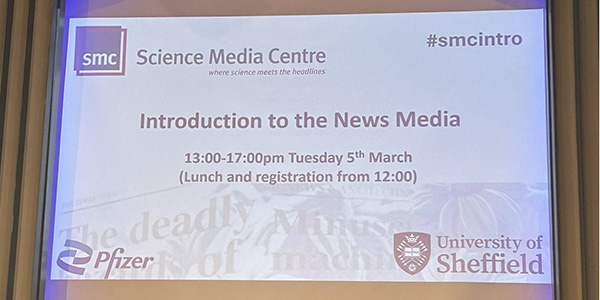Society trusts scientists, so trust yourself and talk to the press
Posted on Wednesday 6 March 2024

Many early career researchers, like myself, resist sharing their research and expertise in the news because of the feelings associated with imposter syndrome, wanting to defer to senior scientists as the experts, and the potential fear of our words being twisted by the media.
Thanks to an entertaining afternoon spent with the Science Media Centre (SMC) at their Introduction to News Media session, hosted by the University of Sheffield on 5 March, I no longer have such feelings. The SMC is an independent organisation helping to instil scientific expertise into traditional news media. They help balance media narratives by connecting scientists with journalists to help bring more nuanced perspectives to controversial, complex and messy topics.
The session consisted of two panel discussions featuring both sides of the science-news spectrum, where experiences and advice for helping scientists work with the news most effectively were shared. First, we heard from seasoned journalists including Tom Heap (Sky News, BBC Countryfile and The Climate Show), Nicola Davis (The Guardian), Adam Fowler (ITV Calendar) and Ethan Ennals (Mail on Sunday), who work on science, environment and health topics across the news cycle. Second, we heard from senior scientists including Professor Jonathan Ball (Liverpool School of Tropical Medicine), Professor Bernadka Dubicka (Hull York Medical School), Professor Jon Gibbins (University of Sheffield), and Professor Janet Cade (University of Leeds), who work across a range of scientific disciplines and have extensive experience working with news media.
My main takeaway from the panels was the importance of ‘brevity, clarity, and enthusiasm’ when working with news media. So, with that in mind, here is my cheat sheet from the session on how to get the most out of working with the news for yourself and your research.
7 steps to get your research and expertise in the news
1) Be Organised
Use your organisation's Press Office (PO) to connect with the SMC and directly with news media. POs know who to talk to and when is the right time for research to be shared. Give your PO and the connected journalists enough notice of when you will have news-worthy research published. This is especially important for more controversial research or research that will likely engage public interest.
2) Be Accessible
Short phone calls (max. 20 minutes) were the resounding preferred method of communication for journalists seeking comments from scientists. So, list your phone number on your professional online profiles for journalists to easily contact you. Keep your publication records and social media presence up to date if you want to be trusted as a relevant expert.
3) Be fast
Journalists can potentially work on four to five articles a day, so if you are not available for a comment, they will find someone else who is. The reality of this means that you may disagree with the expert’s opinion that they find. So, be ready to talk when your topic is in the news, or your research is being published.
4) Be brief
Quick, decisive comments are often better than elaborate answers. Journalists potentially only have a few hours to write an article, so getting a quote quickly is imperative. This also requires scientists to have a thick skin. Journalists will challenge you to make sure your research is robust.
5) Be clear
You will not be able to review your quotes before they are published. Try to speak on three key points of your research and stick to them. More than three and the accuracy of your points will likely get lost. Plan your answers in sound-bites to ensure the points you want to make come across clearly and accurately. Clarity can also come from providing visual keys for audiences. Remember to take pictures and videos throughout your research projects, as journalists will use any images available to help tell a story.
6) Be enthusiastic
Modesty is not helpful. Not for you or your research, and not for the journalists trying to communicate it to lay audiences in a few hundred words. Do not undersell your research, or bore journalists with the minutiae. Your enthusiasm for your research will help sell the story to the journalist and their audiences.
7) Be confident
You are an expert in your field. This is true, even if your specific, niche research topic is not being focused on. Your expert opinion on the wider research field is still relevant when it is in the news. The general public wants to understand impacts of research more than the intricate methodological details. So, if your expertise aligns with the research field in focus, be confident and comment on it.
I highly recommend any scientist (no matter your discipline) to attend future SMC sessions. It was an entertaining, informative afternoon and best of all, completely free, which is a great bonus for early career researchers like myself, many of whom were in attendance. You will learn about how communicating your research and expertise can benefit your career and ultimately generate real-world societal impact.
I wholeheartedly agree with the SMC ethos that “we will get the media to DO science better when scientists DO media better.” On that note, hopefully this blog helps spread some of the key ways we as scientists can engage with news media going forward.
